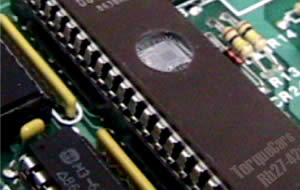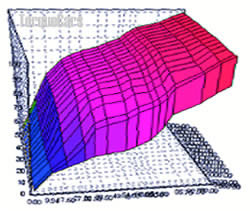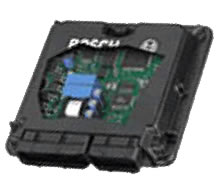Remapped sport computer tuning ECU remaps
"ECU reloaded"

Back in the good old days - the task of timing the ignition spark was performed by the distributor. The greater the RPM, the more the timing would advance.
This did a reasonable job but for the most effective power you would need to vary the timing to a greater degree than a fixed ratio advance curve. The electronic ignition system was borne.
A complete map of variables was entered into the ignition program and preset timing would be read from a table.
Now air temperature, engine speed, engine load and even control over turbo waste gate control means that precise management of the engine ignition timing is possible and you can achieve the maximum power output throughout the rev range.
So what does ECU remapping do?
Electronic ignition allows the manufacturer to fine tune economy at popular road speeds such as 30mph, 56mph and 70mph where most cars spend a large proportion of their time. It is now possible to advance the timing if the throttle is wide open to give greater power or back off the timing when cruising at constant speed.
When a manufacturer creates a timing MAP they build into it a big margin of error to cope with: Adverse temperature ranges, minor faults & bad conditions. Manufacturers do not want people breaking down, suffering premature parts failure or a reputation for uneconomical cars.
Each car that leaves the production line is also unique some achieve 10bhp less and others can be 10bhp up on standard specs, depending on how well the components are machined and put together. So rather than put each car through a unique assessment and a bespoke timing map, they adopt a standard one map fits all philosophy.
It is also a fact that manufacturers use the remap to produce different power versions of the same engine and get lower insurance cover ratings and better fuel consumption. You start to see the fantastic scope for improvement, then, when you add into the mix the fact that the average TorqueCars reader will be adding better performing components to the car, you have a really strong case for a remap.
Other things that the manufacturer builds in to their map equation is the possibility of user neglect ie: infrequent servicing with items struggling like dirty plugs, bad leads, clogged air filter, partially blocked injectors etc... The list goes on.

Who should remap? Anyone who has added performance parts to the engine should consider a remap. If your car is a turbo model, there are massive power gains on offer and TorqueCars would strongly recommend a remap.
What are the hidden costs or drawbacks? You will need to be prepared to keep the car serviced more frequently, and, sometimes decreasing the service interval by half. When you fill up you are also restricting yourself to high quality fuel and you must be prepared to replace components that fail due to the extra work they are doing.
When an engine is tuned to produce more power, you are also creating more stress and strain, so things will start to fail such as air flow sensors. Also turbos can wear out, other major components like pistons and bearings will need care and attention and you will find that the clutch lasts a shorter time.
If you do not have a turbo there is very little to be gained by a remap alone - perhaps only a few BHP so TorqueCars recommendation for non turbo cars is to modify everything else first (cams,pistons, increase compression, engine balance, air intake, exhaust, head work, bigger valves etc...) after these things have been done you can then consider a remap which will help you get the full benefit from them.
On the subject of turbos, (briefly though as we have a comprehensive article on turbos in the forced induction section), a remap will often introduce boost from lower down the rev range and because of this the turbo is running faster and hotter. In this situation you must let the turbo cool down a little before shutting off the engine, otherwise the oil will degrade and you will have an expensive turbo repair on your hands. Fitting a turbo timer will also help with this problem and keeps the engine ticking over.
Of course the amount of power you choose has a bearing on the reliability and cost of running the car. Many people go for an off the shelf remap which are on offer all over the country and typically cost around £200-£500.
This is better than the manufacturers map in that it uses tighter parameters but it is still a one size fits all job. If you are after big power gains and have changed major components like the turbo, waste gate and have done extensive engine work then a custom remap is the best option.

Switchable remaps. Things have moved on and it is now possible to have a few maps stored which you can select from. It is typical to have a valet mode to stop the boy racers at the garage thrashing your pride and joy on the "test run" to bed in the new wiper blades they have fitted. Then there is often an economy option to give very frugal fuel consumption, particularly useful when cruising on long journeys.
Then you have the 'sport' or 'power' modes which give lots of power and often require high octane fuel. Torque.Cars strongly recommend that you get a switchable remap - it may cost a little more at the outset but you will avoid many of the pitfalls of running a high power remap all of the time by doing this and get the best of both worlds.
Please do not confuse a remap with the little "tuning boxes" you can buy for £50 which generally contain little more than a £3 resistor and often do little more than fool the car into thinking the air is cooler than it is. If it was really this easy to get more power from a car then the manufacturers would have already done that themselves.
Some cars are not easy to remap, I remember that the Rover MEMS & Toyota ECU's are a case in point. The Manufacturer holds the key to the ECU and locks their Map into their firmware. Some ECU's are just plain and simply not reprogrammable so what can you do? Is there an option? Well thankfully there is and they are called piggy back ECU's or aftermarket ECU's.
Piggy back & Aftermarket ecus:
Piggy back ECUs connect between your existing ECU and the engine sensor inputs and outputs. All work slightly differently and apply all or some of the following combinations.
Some will adjust the sensor readings such as air temp engine speed crank position and effectively lie to the standard ECU forcing a more aggressive timing. Some will actually perform their own calculations and take over control of some aspects of engine management like turbo waste gate control and ignition timing. Some will take the standard ECU output and modify the signals sent to change timing and learn to guess the next output a split second before it is needed using the base ECU map and just enhancing it a little.
Aftermarket ECUS are often direct replacements for the cars ECU and will take over all the function associated with it. They are generally faster and able to cope with a wide variety of additional factors such as water/methanol injection and a turbo timer.
Be wary though as some piggy back ecus and aftermarket ECU do not include knock protection. If this is the case then set your timing conservatively and use high octane fuel.
As with all ECU upgrades you are still dependant on having the car in top condition as you are removing the tolerances built in for dirty plugs, cheap fuel, or minor electrical faults. Join us in the TorqueCars forum to discuss all aspects of ECU tuning and sport computers.
If you liked this page please share it with your friends, drop a link to it in your favourite forum or use the bookmarking options to save it to your social media profile.
Check out TorqueCars new YouTube channel, and see their awesome new content...
Feedback
Please use our forums if you wish to ask a tuning question, and please note we do not sell parts or services, we are just an online magazine.
Help us improve, leave a suggestion or tip
